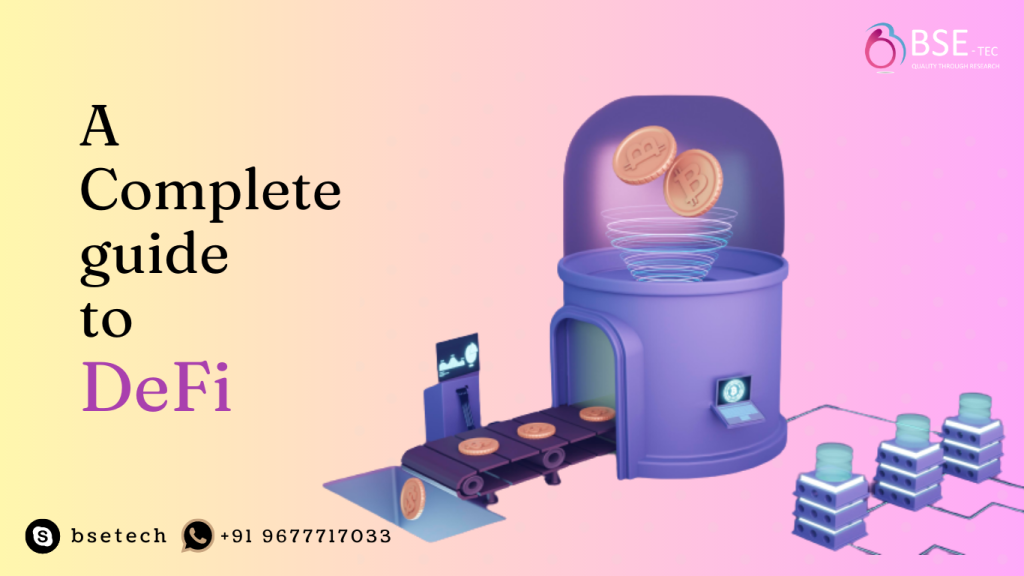DeFi – a Complete Guide

DeFi applications are built on a decentralized architecture, which means that there is no central authority or entity that controls the platform. This ensures that the platform is open, transparent, and resistant to censorship thus making it the biggest game changer of the blockchain ecosystem in the upcoming years. So, here is a blog post on a basic understanding of what is Decentralized Finance, and why it is becoming a mainstream blockchain use case!
What is Decentralized Finance (DeFi)?
Traditional financial transactions involve other governing authorities like banks and other financial institutions who take service charges for all the transactions occurred. But, with the Decentralized Finance (DeFi) services, individuals can conduct peer-to-peer transactions without the need for intermediaries thus saving hefty amounts of service charges and other additional costs. You can lend, buy, sell, trade, and stake your currencies without a central authority. In short, deFi eliminates financial intermediaries. DeFi is going to be that one massive solution for all our financial sector issues.
“We are a stone’s throw away from the global financial industry running on a common software infrastructure.”
–Lex Sokolin, Global Fintech Co-Head of ConsenSys
Why DeFi?
Here are some of the key advantages of DeFi and why DeFi is much better than any traditional finance system.
- Decentralization
DeFi Applications are built on a decentralized architecture, which means that there is no central authority or entity that controls the platform. This ensures that the platform is open, transparent, and censorship-resistant.
- Permissionless
Blockchain platforms are permissionless in nature unless it is designed to be a permissioned chain for enterprise reasons. Here, there are no restrictions, or interventions of third-party organizations to control the platform, anyone can involve in the consensus mechanism and participate in the platform’s core activities.
- Programmable
Programmable blockchain platforms are a potential game-changer. A programmable blockchain is essentially a global computer where the results of every computation can be seen by anyone. For example, Ethereum has a programming language called Solidity, which made us to think of much more use cases than being just a peer-to-peer transaction platform.
- Transparent
One of the key advantages of DeFi is its open and transparent nature. All transactions on a blockchain network are publicly recorded and can be verified by anyone. This transparency helps to increase trust and reduce the risk of fraud, making DeFi a popular choice for many users.
- Interoperable
Currently, most DeFi protocols operate in isolation from each other, with limited interoperability. However, the development of cross-chain solutions such as Polkadot and Cosmos could allow for seamless interaction between different DeFi platforms, creating a more interconnected and efficient ecosystem.
How Does DeFi Work?
The core element of DeFi is decentralization. There is no central authority or third-party organizations, it is based purely on peer-to-peer transactions for lending, borrowing, staking, and other financial transactions.
DeFi Financial Services
Here are some of the DeFi financial services that are going to change the blockchain ecosystem in a more rewarding way.
- Stable Coins
Stablecoins are a type of cryptocurrency designed to maintain a stable value in relation to a specific asset or group of assets, such as the U.S. dollar, gold, or other cryptocurrencies.
- Lending and Borrowing
One of the most popular DeFi financial services is lending and borrowing. DeFi lending platforms allow users to lend their cryptocurrency assets to other users who need them, in exchange for interest payments.
- Tokenization
Tokenization is the process of converting a physical asset, such as real estate, artwork, or stocks, into digital tokens that can be traded on a blockchain.
- Decentralized Exchanges (DEX)
DEX is one of the most beneficial DeFi Financial Services, It allows users to trade cryptocurrencies directly without any third-party organization like trading exchanges.
- Insurance
DeFi insurance platforms allow users to purchase insurance for their cryptocurrency assets, providing protection against risks such as hacks, theft, and smart contract failures.
- Asset Management
DeFi asset management platforms allow users to invest their cryptocurrency assets in a range of different strategies, such as index funds, yield farming, and liquidity provision.
Henceforth, the DeFi systems are more effective and efficient than the traditional ones, that’s why many decentralized Apps (dApps) are becoming more welcomed. So, if you have a blockchain project in mind, feel free to discuss it with the best blockchain app development company. Get in touch with BSEtec, to leverage the power of blockchain for your enterprise.
Did you find this article useful? Let us know by leaving a comment below or join us on Twitter and Facebook.




